Leadership and Management for Service Industries: Corinthia Hotel
VerifiedAdded on 2022/11/30
|12
|3408
|184
Report
AI Summary
This report examines leadership and management principles within the context of the hospitality industry, using Corinthia Hotel London as a case study. It begins with an assessment of classical management theories like scientific and bureaucratic management, evaluating their relevance and application within the hotel. The report then analyzes leadership styles, including autocratic, laissez-faire, and participative approaches, and reviews how Corinthia Hotel might adopt persuasive and collaborative management styles. Internal factors, such as human resources and organizational culture, and external factors, including legislation, are discussed in relation to their impact on management styles and organizational structure. The report identifies existing soft and hard management skills required by the hotel, like time management, communication, and commercial expertise. The report concludes with a discussion of future management and leadership skills needed for the hotel's continued success, especially in relation to sustainability.
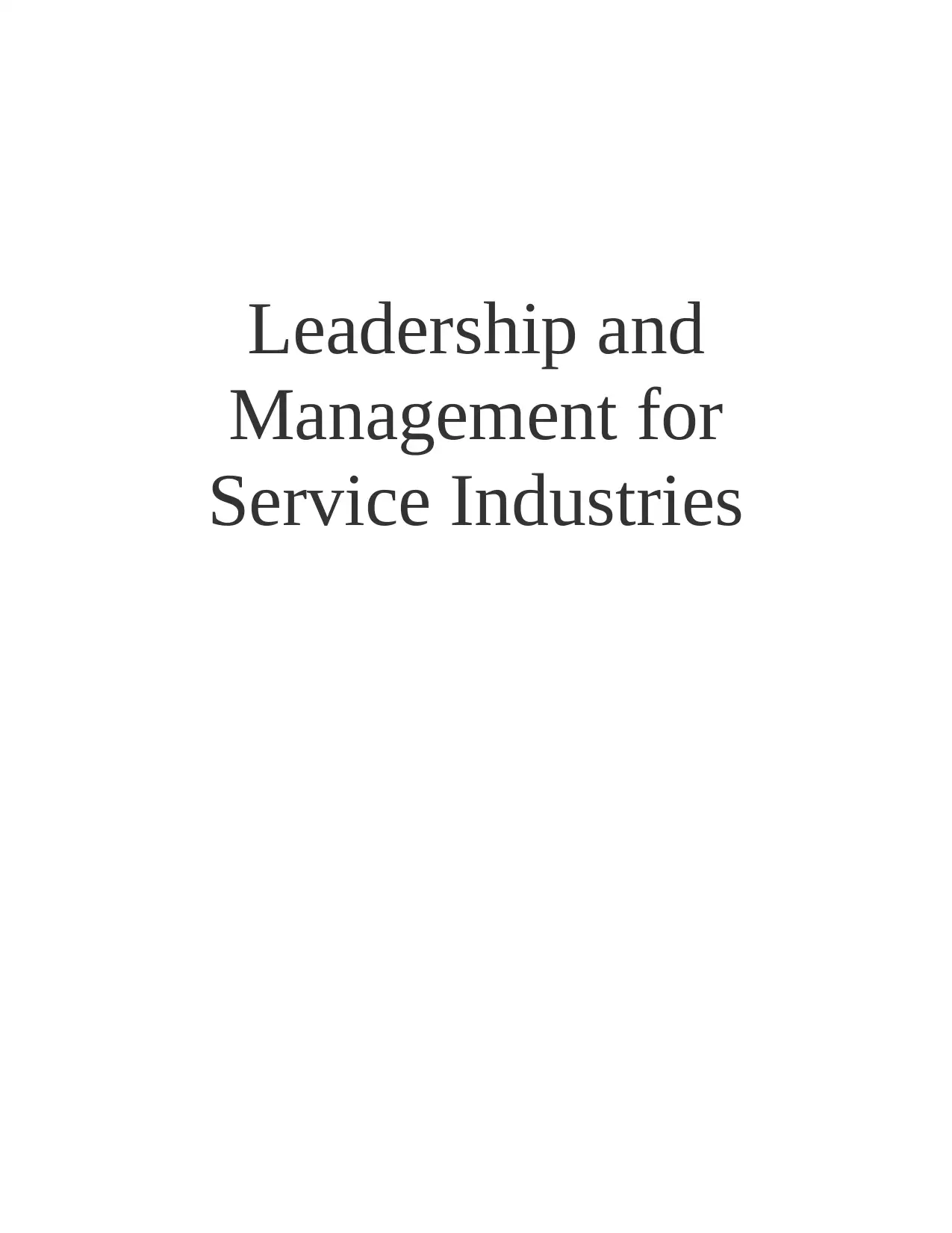
Leadership and
Management for
Service Industries
Management for
Service Industries
Paraphrase This Document
Need a fresh take? Get an instant paraphrase of this document with our AI Paraphraser
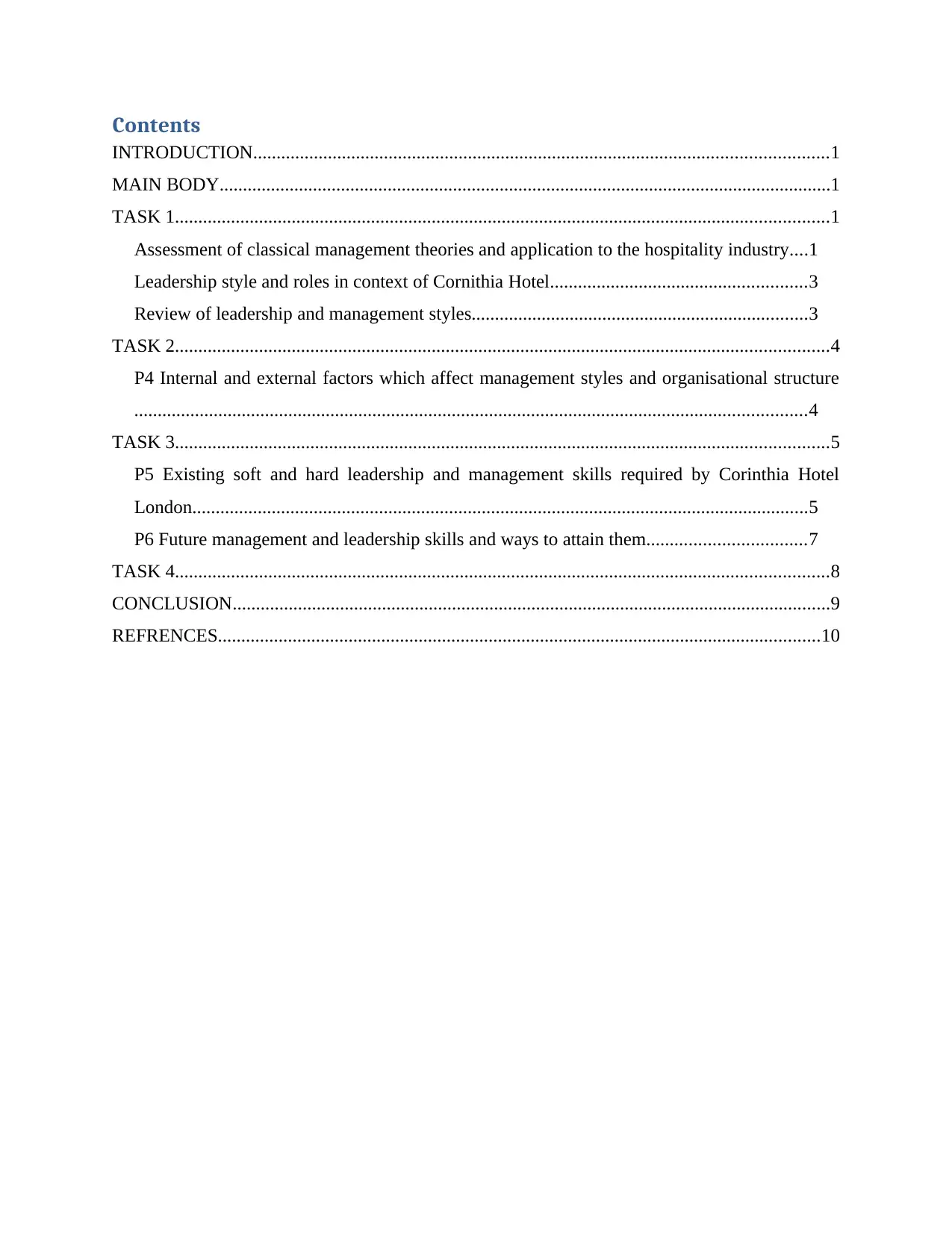
Contents
INTRODUCTION...........................................................................................................................1
MAIN BODY...................................................................................................................................1
TASK 1............................................................................................................................................1
Assessment of classical management theories and application to the hospitality industry....1
Leadership style and roles in context of Cornithia Hotel.......................................................3
Review of leadership and management styles........................................................................3
TASK 2............................................................................................................................................4
P4 Internal and external factors which affect management styles and organisational structure
................................................................................................................................................4
TASK 3............................................................................................................................................5
P5 Existing soft and hard leadership and management skills required by Corinthia Hotel
London....................................................................................................................................5
P6 Future management and leadership skills and ways to attain them..................................7
TASK 4............................................................................................................................................8
CONCLUSION................................................................................................................................9
REFRENCES.................................................................................................................................10
INTRODUCTION...........................................................................................................................1
MAIN BODY...................................................................................................................................1
TASK 1............................................................................................................................................1
Assessment of classical management theories and application to the hospitality industry....1
Leadership style and roles in context of Cornithia Hotel.......................................................3
Review of leadership and management styles........................................................................3
TASK 2............................................................................................................................................4
P4 Internal and external factors which affect management styles and organisational structure
................................................................................................................................................4
TASK 3............................................................................................................................................5
P5 Existing soft and hard leadership and management skills required by Corinthia Hotel
London....................................................................................................................................5
P6 Future management and leadership skills and ways to attain them..................................7
TASK 4............................................................................................................................................8
CONCLUSION................................................................................................................................9
REFRENCES.................................................................................................................................10
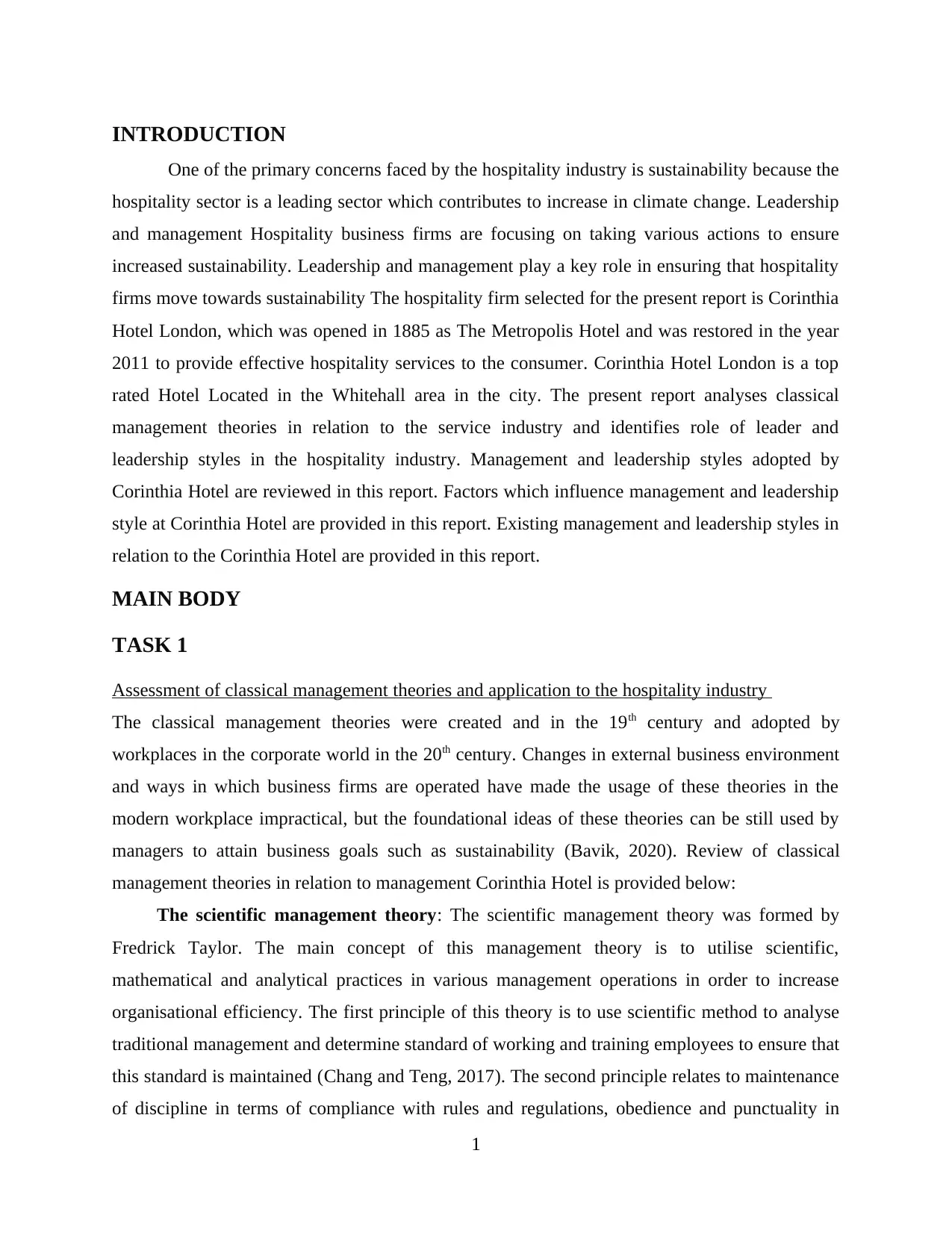
INTRODUCTION
One of the primary concerns faced by the hospitality industry is sustainability because the
hospitality sector is a leading sector which contributes to increase in climate change. Leadership
and management Hospitality business firms are focusing on taking various actions to ensure
increased sustainability. Leadership and management play a key role in ensuring that hospitality
firms move towards sustainability The hospitality firm selected for the present report is Corinthia
Hotel London, which was opened in 1885 as The Metropolis Hotel and was restored in the year
2011 to provide effective hospitality services to the consumer. Corinthia Hotel London is a top
rated Hotel Located in the Whitehall area in the city. The present report analyses classical
management theories in relation to the service industry and identifies role of leader and
leadership styles in the hospitality industry. Management and leadership styles adopted by
Corinthia Hotel are reviewed in this report. Factors which influence management and leadership
style at Corinthia Hotel are provided in this report. Existing management and leadership styles in
relation to the Corinthia Hotel are provided in this report.
MAIN BODY
TASK 1
Assessment of classical management theories and application to the hospitality industry
The classical management theories were created and in the 19th century and adopted by
workplaces in the corporate world in the 20th century. Changes in external business environment
and ways in which business firms are operated have made the usage of these theories in the
modern workplace impractical, but the foundational ideas of these theories can be still used by
managers to attain business goals such as sustainability (Bavik, 2020). Review of classical
management theories in relation to management Corinthia Hotel is provided below:
The scientific management theory: The scientific management theory was formed by
Fredrick Taylor. The main concept of this management theory is to utilise scientific,
mathematical and analytical practices in various management operations in order to increase
organisational efficiency. The first principle of this theory is to use scientific method to analyse
traditional management and determine standard of working and training employees to ensure that
this standard is maintained (Chang and Teng, 2017). The second principle relates to maintenance
of discipline in terms of compliance with rules and regulations, obedience and punctuality in
1
One of the primary concerns faced by the hospitality industry is sustainability because the
hospitality sector is a leading sector which contributes to increase in climate change. Leadership
and management Hospitality business firms are focusing on taking various actions to ensure
increased sustainability. Leadership and management play a key role in ensuring that hospitality
firms move towards sustainability The hospitality firm selected for the present report is Corinthia
Hotel London, which was opened in 1885 as The Metropolis Hotel and was restored in the year
2011 to provide effective hospitality services to the consumer. Corinthia Hotel London is a top
rated Hotel Located in the Whitehall area in the city. The present report analyses classical
management theories in relation to the service industry and identifies role of leader and
leadership styles in the hospitality industry. Management and leadership styles adopted by
Corinthia Hotel are reviewed in this report. Factors which influence management and leadership
style at Corinthia Hotel are provided in this report. Existing management and leadership styles in
relation to the Corinthia Hotel are provided in this report.
MAIN BODY
TASK 1
Assessment of classical management theories and application to the hospitality industry
The classical management theories were created and in the 19th century and adopted by
workplaces in the corporate world in the 20th century. Changes in external business environment
and ways in which business firms are operated have made the usage of these theories in the
modern workplace impractical, but the foundational ideas of these theories can be still used by
managers to attain business goals such as sustainability (Bavik, 2020). Review of classical
management theories in relation to management Corinthia Hotel is provided below:
The scientific management theory: The scientific management theory was formed by
Fredrick Taylor. The main concept of this management theory is to utilise scientific,
mathematical and analytical practices in various management operations in order to increase
organisational efficiency. The first principle of this theory is to use scientific method to analyse
traditional management and determine standard of working and training employees to ensure that
this standard is maintained (Chang and Teng, 2017). The second principle relates to maintenance
of discipline in terms of compliance with rules and regulations, obedience and punctuality in
1
⊘ This is a preview!⊘
Do you want full access?
Subscribe today to unlock all pages.

Trusted by 1+ million students worldwide
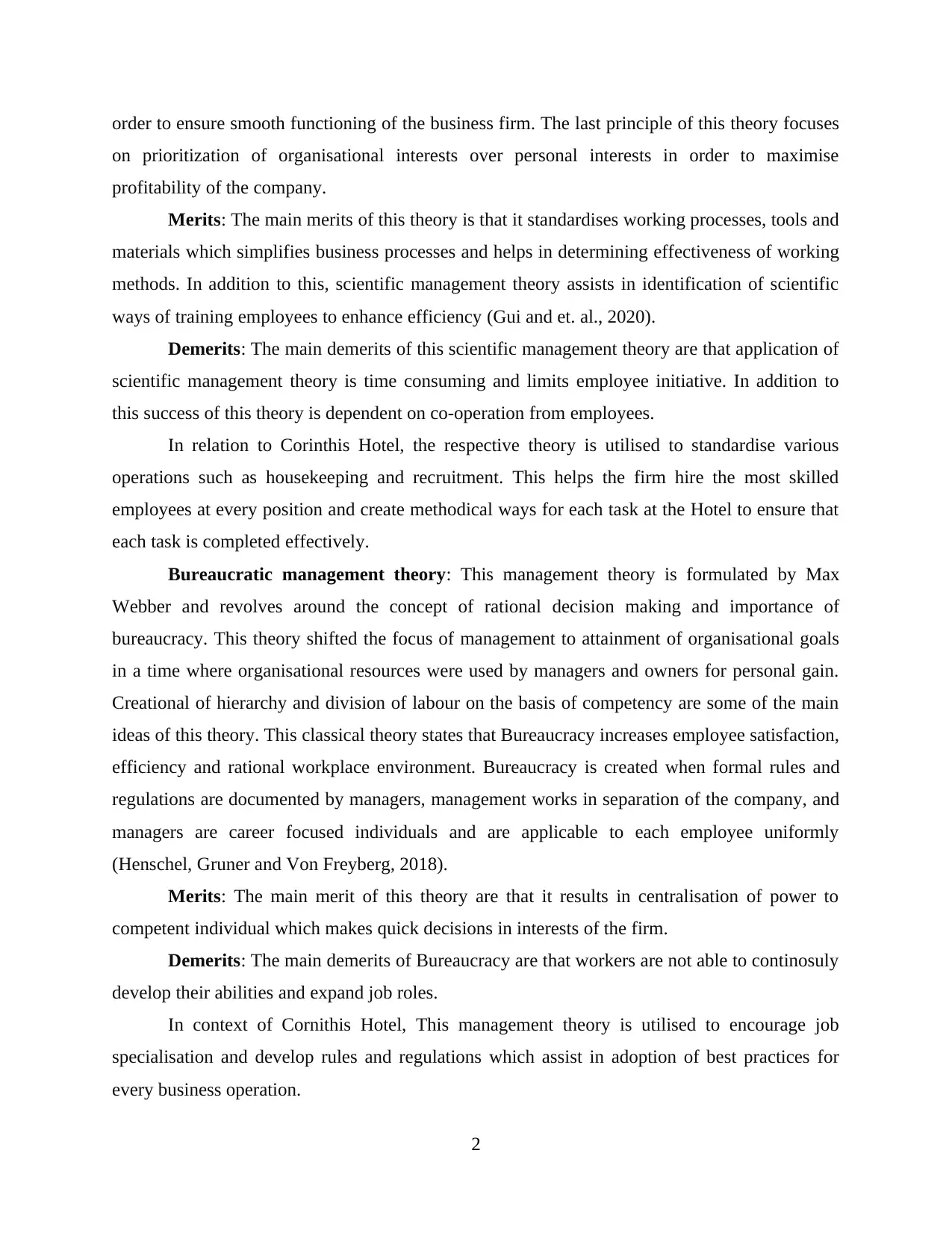
order to ensure smooth functioning of the business firm. The last principle of this theory focuses
on prioritization of organisational interests over personal interests in order to maximise
profitability of the company.
Merits: The main merits of this theory is that it standardises working processes, tools and
materials which simplifies business processes and helps in determining effectiveness of working
methods. In addition to this, scientific management theory assists in identification of scientific
ways of training employees to enhance efficiency (Gui and et. al., 2020).
Demerits: The main demerits of this scientific management theory are that application of
scientific management theory is time consuming and limits employee initiative. In addition to
this success of this theory is dependent on co-operation from employees.
In relation to Corinthis Hotel, the respective theory is utilised to standardise various
operations such as housekeeping and recruitment. This helps the firm hire the most skilled
employees at every position and create methodical ways for each task at the Hotel to ensure that
each task is completed effectively.
Bureaucratic management theory: This management theory is formulated by Max
Webber and revolves around the concept of rational decision making and importance of
bureaucracy. This theory shifted the focus of management to attainment of organisational goals
in a time where organisational resources were used by managers and owners for personal gain.
Creational of hierarchy and division of labour on the basis of competency are some of the main
ideas of this theory. This classical theory states that Bureaucracy increases employee satisfaction,
efficiency and rational workplace environment. Bureaucracy is created when formal rules and
regulations are documented by managers, management works in separation of the company, and
managers are career focused individuals and are applicable to each employee uniformly
(Henschel, Gruner and Von Freyberg, 2018).
Merits: The main merit of this theory are that it results in centralisation of power to
competent individual which makes quick decisions in interests of the firm.
Demerits: The main demerits of Bureaucracy are that workers are not able to continosuly
develop their abilities and expand job roles.
In context of Cornithis Hotel, This management theory is utilised to encourage job
specialisation and develop rules and regulations which assist in adoption of best practices for
every business operation.
2
on prioritization of organisational interests over personal interests in order to maximise
profitability of the company.
Merits: The main merits of this theory is that it standardises working processes, tools and
materials which simplifies business processes and helps in determining effectiveness of working
methods. In addition to this, scientific management theory assists in identification of scientific
ways of training employees to enhance efficiency (Gui and et. al., 2020).
Demerits: The main demerits of this scientific management theory are that application of
scientific management theory is time consuming and limits employee initiative. In addition to
this success of this theory is dependent on co-operation from employees.
In relation to Corinthis Hotel, the respective theory is utilised to standardise various
operations such as housekeeping and recruitment. This helps the firm hire the most skilled
employees at every position and create methodical ways for each task at the Hotel to ensure that
each task is completed effectively.
Bureaucratic management theory: This management theory is formulated by Max
Webber and revolves around the concept of rational decision making and importance of
bureaucracy. This theory shifted the focus of management to attainment of organisational goals
in a time where organisational resources were used by managers and owners for personal gain.
Creational of hierarchy and division of labour on the basis of competency are some of the main
ideas of this theory. This classical theory states that Bureaucracy increases employee satisfaction,
efficiency and rational workplace environment. Bureaucracy is created when formal rules and
regulations are documented by managers, management works in separation of the company, and
managers are career focused individuals and are applicable to each employee uniformly
(Henschel, Gruner and Von Freyberg, 2018).
Merits: The main merit of this theory are that it results in centralisation of power to
competent individual which makes quick decisions in interests of the firm.
Demerits: The main demerits of Bureaucracy are that workers are not able to continosuly
develop their abilities and expand job roles.
In context of Cornithis Hotel, This management theory is utilised to encourage job
specialisation and develop rules and regulations which assist in adoption of best practices for
every business operation.
2
Paraphrase This Document
Need a fresh take? Get an instant paraphrase of this document with our AI Paraphraser
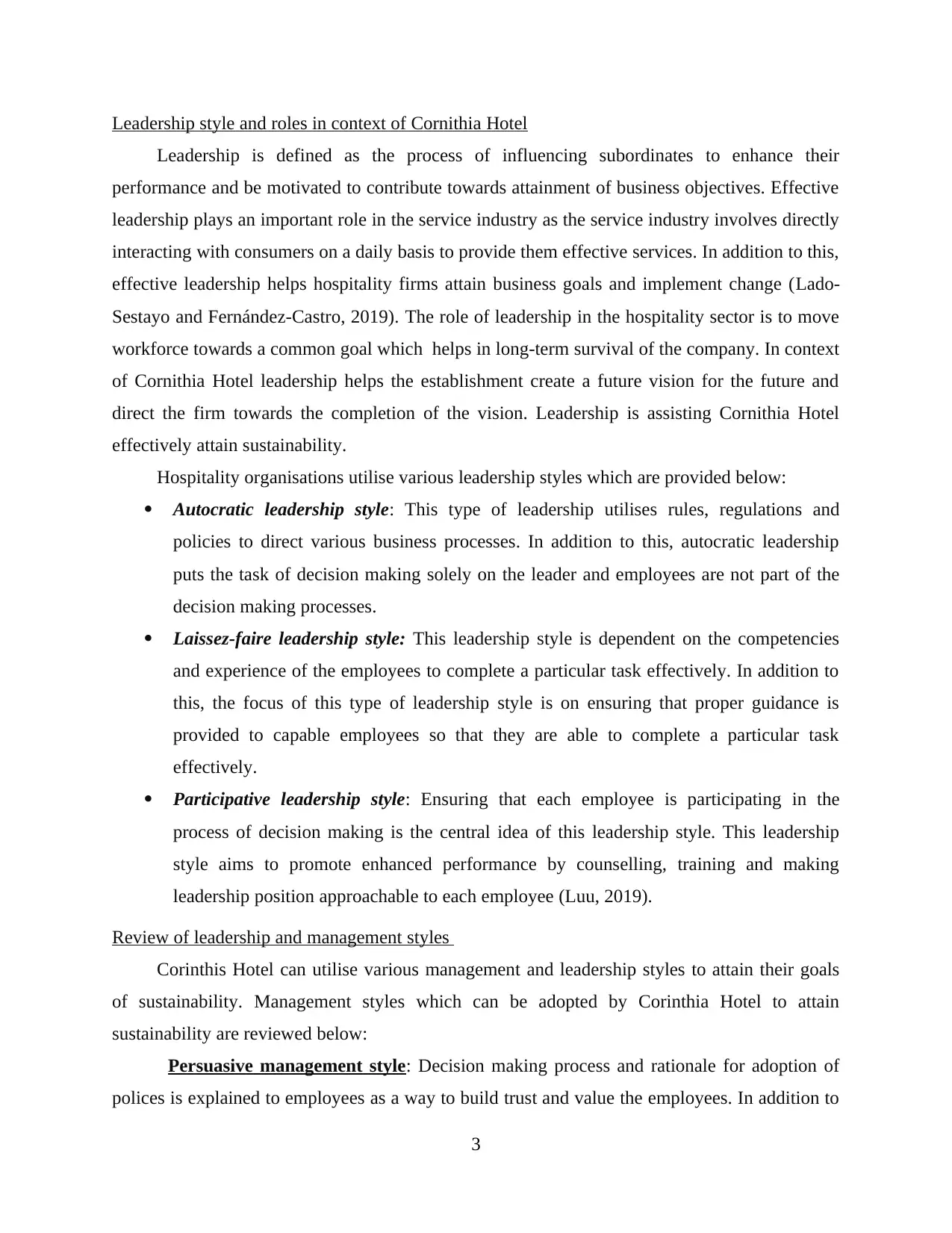
Leadership style and roles in context of Cornithia Hotel
Leadership is defined as the process of influencing subordinates to enhance their
performance and be motivated to contribute towards attainment of business objectives. Effective
leadership plays an important role in the service industry as the service industry involves directly
interacting with consumers on a daily basis to provide them effective services. In addition to this,
effective leadership helps hospitality firms attain business goals and implement change (Lado-
Sestayo and Fernández-Castro, 2019). The role of leadership in the hospitality sector is to move
workforce towards a common goal which helps in long-term survival of the company. In context
of Cornithia Hotel leadership helps the establishment create a future vision for the future and
direct the firm towards the completion of the vision. Leadership is assisting Cornithia Hotel
effectively attain sustainability.
Hospitality organisations utilise various leadership styles which are provided below:
Autocratic leadership style: This type of leadership utilises rules, regulations and
policies to direct various business processes. In addition to this, autocratic leadership
puts the task of decision making solely on the leader and employees are not part of the
decision making processes.
Laissez-faire leadership style: This leadership style is dependent on the competencies
and experience of the employees to complete a particular task effectively. In addition to
this, the focus of this type of leadership style is on ensuring that proper guidance is
provided to capable employees so that they are able to complete a particular task
effectively.
Participative leadership style: Ensuring that each employee is participating in the
process of decision making is the central idea of this leadership style. This leadership
style aims to promote enhanced performance by counselling, training and making
leadership position approachable to each employee (Luu, 2019).
Review of leadership and management styles
Corinthis Hotel can utilise various management and leadership styles to attain their goals
of sustainability. Management styles which can be adopted by Corinthia Hotel to attain
sustainability are reviewed below:
Persuasive management style: Decision making process and rationale for adoption of
polices is explained to employees as a way to build trust and value the employees. In addition to
3
Leadership is defined as the process of influencing subordinates to enhance their
performance and be motivated to contribute towards attainment of business objectives. Effective
leadership plays an important role in the service industry as the service industry involves directly
interacting with consumers on a daily basis to provide them effective services. In addition to this,
effective leadership helps hospitality firms attain business goals and implement change (Lado-
Sestayo and Fernández-Castro, 2019). The role of leadership in the hospitality sector is to move
workforce towards a common goal which helps in long-term survival of the company. In context
of Cornithia Hotel leadership helps the establishment create a future vision for the future and
direct the firm towards the completion of the vision. Leadership is assisting Cornithia Hotel
effectively attain sustainability.
Hospitality organisations utilise various leadership styles which are provided below:
Autocratic leadership style: This type of leadership utilises rules, regulations and
policies to direct various business processes. In addition to this, autocratic leadership
puts the task of decision making solely on the leader and employees are not part of the
decision making processes.
Laissez-faire leadership style: This leadership style is dependent on the competencies
and experience of the employees to complete a particular task effectively. In addition to
this, the focus of this type of leadership style is on ensuring that proper guidance is
provided to capable employees so that they are able to complete a particular task
effectively.
Participative leadership style: Ensuring that each employee is participating in the
process of decision making is the central idea of this leadership style. This leadership
style aims to promote enhanced performance by counselling, training and making
leadership position approachable to each employee (Luu, 2019).
Review of leadership and management styles
Corinthis Hotel can utilise various management and leadership styles to attain their goals
of sustainability. Management styles which can be adopted by Corinthia Hotel to attain
sustainability are reviewed below:
Persuasive management style: Decision making process and rationale for adoption of
polices is explained to employees as a way to build trust and value the employees. In addition to
3
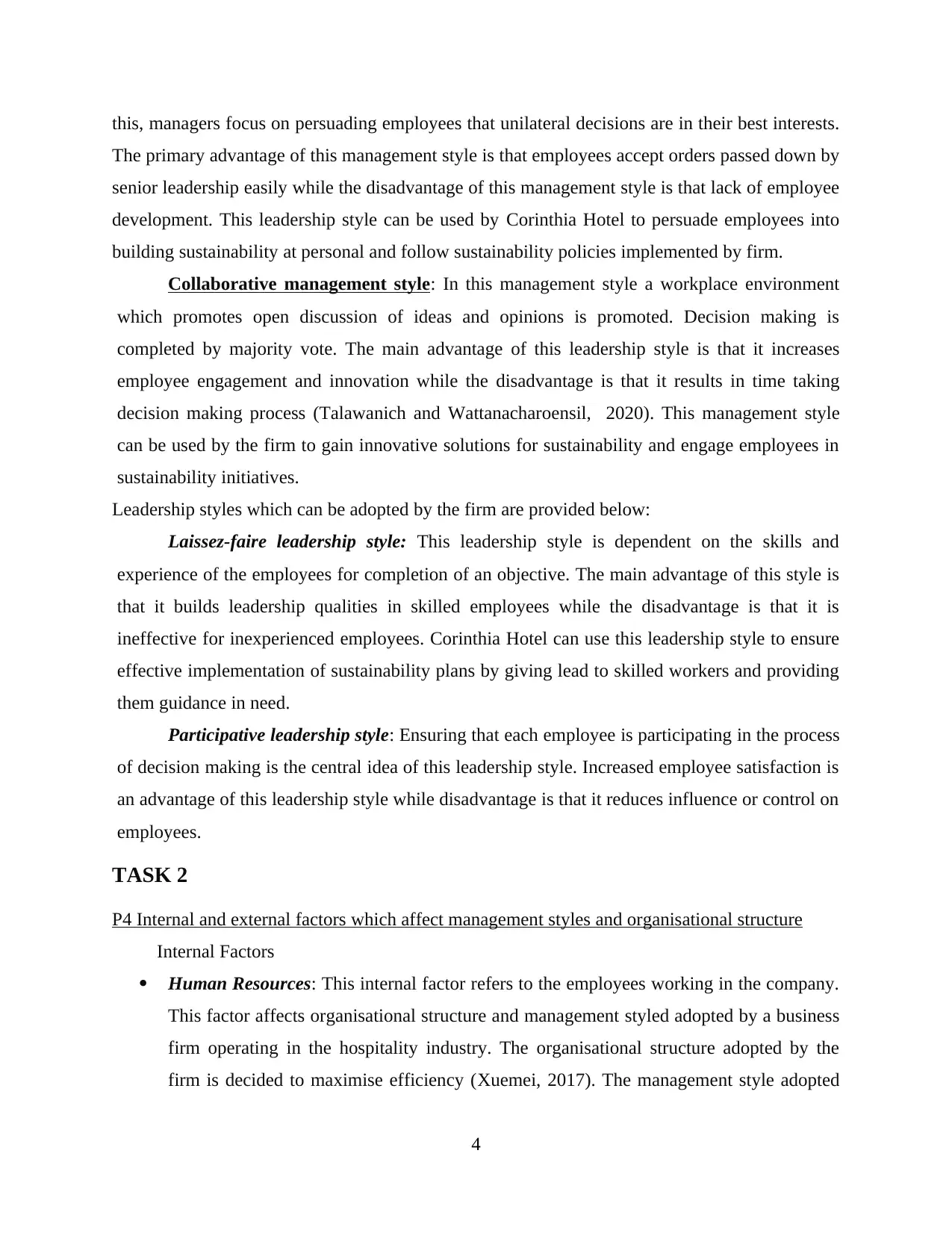
this, managers focus on persuading employees that unilateral decisions are in their best interests.
The primary advantage of this management style is that employees accept orders passed down by
senior leadership easily while the disadvantage of this management style is that lack of employee
development. This leadership style can be used by Corinthia Hotel to persuade employees into
building sustainability at personal and follow sustainability policies implemented by firm.
Collaborative management style: In this management style a workplace environment
which promotes open discussion of ideas and opinions is promoted. Decision making is
completed by majority vote. The main advantage of this leadership style is that it increases
employee engagement and innovation while the disadvantage is that it results in time taking
decision making process (Talawanich and Wattanacharoensil, 2020). This management style
can be used by the firm to gain innovative solutions for sustainability and engage employees in
sustainability initiatives.
Leadership styles which can be adopted by the firm are provided below:
Laissez-faire leadership style: This leadership style is dependent on the skills and
experience of the employees for completion of an objective. The main advantage of this style is
that it builds leadership qualities in skilled employees while the disadvantage is that it is
ineffective for inexperienced employees. Corinthia Hotel can use this leadership style to ensure
effective implementation of sustainability plans by giving lead to skilled workers and providing
them guidance in need.
Participative leadership style: Ensuring that each employee is participating in the process
of decision making is the central idea of this leadership style. Increased employee satisfaction is
an advantage of this leadership style while disadvantage is that it reduces influence or control on
employees.
TASK 2
P4 Internal and external factors which affect management styles and organisational structure
Internal Factors
Human Resources: This internal factor refers to the employees working in the company.
This factor affects organisational structure and management styled adopted by a business
firm operating in the hospitality industry. The organisational structure adopted by the
firm is decided to maximise efficiency (Xuemei, 2017). The management style adopted
4
The primary advantage of this management style is that employees accept orders passed down by
senior leadership easily while the disadvantage of this management style is that lack of employee
development. This leadership style can be used by Corinthia Hotel to persuade employees into
building sustainability at personal and follow sustainability policies implemented by firm.
Collaborative management style: In this management style a workplace environment
which promotes open discussion of ideas and opinions is promoted. Decision making is
completed by majority vote. The main advantage of this leadership style is that it increases
employee engagement and innovation while the disadvantage is that it results in time taking
decision making process (Talawanich and Wattanacharoensil, 2020). This management style
can be used by the firm to gain innovative solutions for sustainability and engage employees in
sustainability initiatives.
Leadership styles which can be adopted by the firm are provided below:
Laissez-faire leadership style: This leadership style is dependent on the skills and
experience of the employees for completion of an objective. The main advantage of this style is
that it builds leadership qualities in skilled employees while the disadvantage is that it is
ineffective for inexperienced employees. Corinthia Hotel can use this leadership style to ensure
effective implementation of sustainability plans by giving lead to skilled workers and providing
them guidance in need.
Participative leadership style: Ensuring that each employee is participating in the process
of decision making is the central idea of this leadership style. Increased employee satisfaction is
an advantage of this leadership style while disadvantage is that it reduces influence or control on
employees.
TASK 2
P4 Internal and external factors which affect management styles and organisational structure
Internal Factors
Human Resources: This internal factor refers to the employees working in the company.
This factor affects organisational structure and management styled adopted by a business
firm operating in the hospitality industry. The organisational structure adopted by the
firm is decided to maximise efficiency (Xuemei, 2017). The management style adopted
4
⊘ This is a preview!⊘
Do you want full access?
Subscribe today to unlock all pages.

Trusted by 1+ million students worldwide
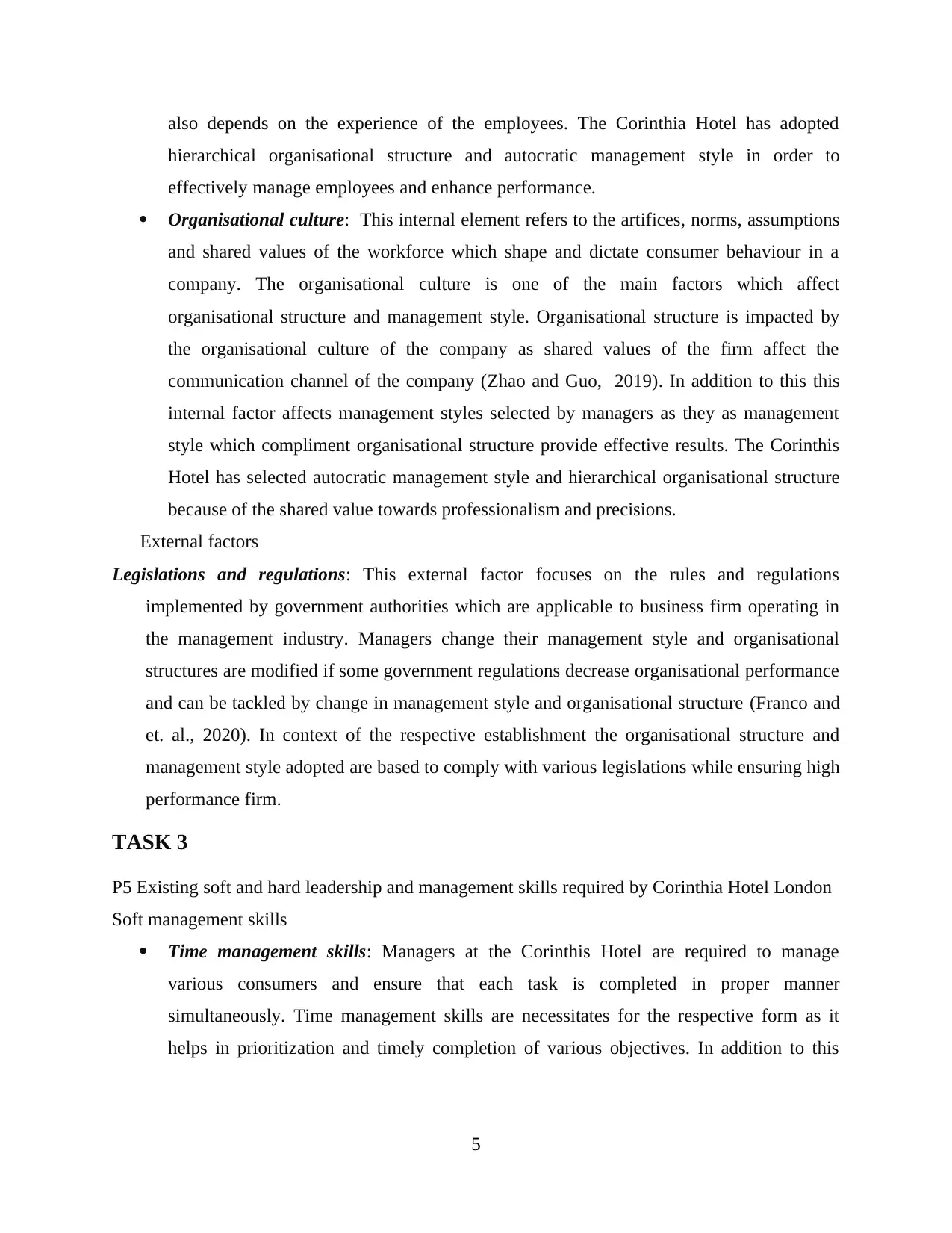
also depends on the experience of the employees. The Corinthia Hotel has adopted
hierarchical organisational structure and autocratic management style in order to
effectively manage employees and enhance performance.
Organisational culture: This internal element refers to the artifices, norms, assumptions
and shared values of the workforce which shape and dictate consumer behaviour in a
company. The organisational culture is one of the main factors which affect
organisational structure and management style. Organisational structure is impacted by
the organisational culture of the company as shared values of the firm affect the
communication channel of the company (Zhao and Guo, 2019). In addition to this this
internal factor affects management styles selected by managers as they as management
style which compliment organisational structure provide effective results. The Corinthis
Hotel has selected autocratic management style and hierarchical organisational structure
because of the shared value towards professionalism and precisions.
External factors
Legislations and regulations: This external factor focuses on the rules and regulations
implemented by government authorities which are applicable to business firm operating in
the management industry. Managers change their management style and organisational
structures are modified if some government regulations decrease organisational performance
and can be tackled by change in management style and organisational structure (Franco and
et. al., 2020). In context of the respective establishment the organisational structure and
management style adopted are based to comply with various legislations while ensuring high
performance firm.
TASK 3
P5 Existing soft and hard leadership and management skills required by Corinthia Hotel London
Soft management skills
Time management skills: Managers at the Corinthis Hotel are required to manage
various consumers and ensure that each task is completed in proper manner
simultaneously. Time management skills are necessitates for the respective form as it
helps in prioritization and timely completion of various objectives. In addition to this
5
hierarchical organisational structure and autocratic management style in order to
effectively manage employees and enhance performance.
Organisational culture: This internal element refers to the artifices, norms, assumptions
and shared values of the workforce which shape and dictate consumer behaviour in a
company. The organisational culture is one of the main factors which affect
organisational structure and management style. Organisational structure is impacted by
the organisational culture of the company as shared values of the firm affect the
communication channel of the company (Zhao and Guo, 2019). In addition to this this
internal factor affects management styles selected by managers as they as management
style which compliment organisational structure provide effective results. The Corinthis
Hotel has selected autocratic management style and hierarchical organisational structure
because of the shared value towards professionalism and precisions.
External factors
Legislations and regulations: This external factor focuses on the rules and regulations
implemented by government authorities which are applicable to business firm operating in
the management industry. Managers change their management style and organisational
structures are modified if some government regulations decrease organisational performance
and can be tackled by change in management style and organisational structure (Franco and
et. al., 2020). In context of the respective establishment the organisational structure and
management style adopted are based to comply with various legislations while ensuring high
performance firm.
TASK 3
P5 Existing soft and hard leadership and management skills required by Corinthia Hotel London
Soft management skills
Time management skills: Managers at the Corinthis Hotel are required to manage
various consumers and ensure that each task is completed in proper manner
simultaneously. Time management skills are necessitates for the respective form as it
helps in prioritization and timely completion of various objectives. In addition to this
5
Paraphrase This Document
Need a fresh take? Get an instant paraphrase of this document with our AI Paraphraser
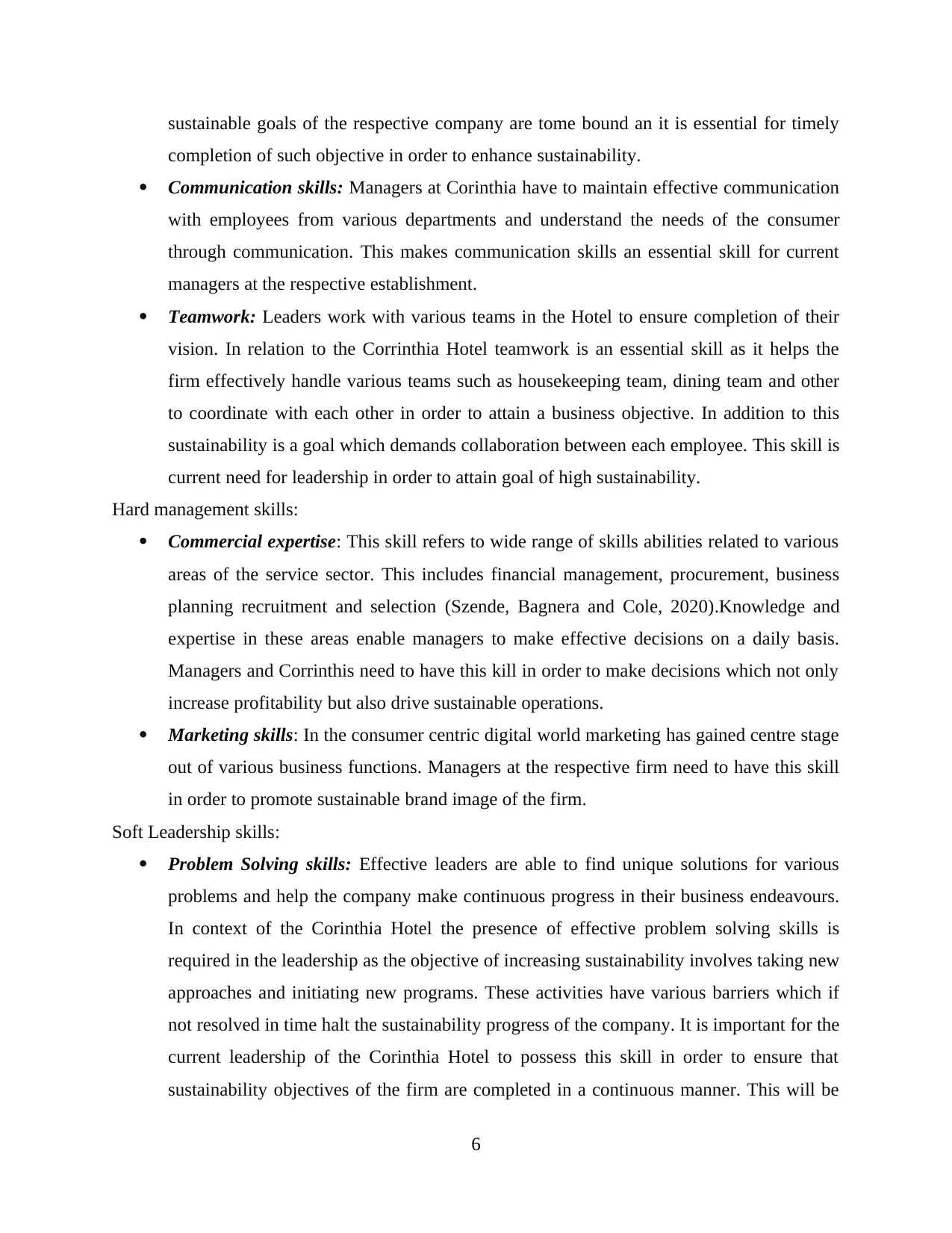
sustainable goals of the respective company are tome bound an it is essential for timely
completion of such objective in order to enhance sustainability.
Communication skills: Managers at Corinthia have to maintain effective communication
with employees from various departments and understand the needs of the consumer
through communication. This makes communication skills an essential skill for current
managers at the respective establishment.
Teamwork: Leaders work with various teams in the Hotel to ensure completion of their
vision. In relation to the Corrinthia Hotel teamwork is an essential skill as it helps the
firm effectively handle various teams such as housekeeping team, dining team and other
to coordinate with each other in order to attain a business objective. In addition to this
sustainability is a goal which demands collaboration between each employee. This skill is
current need for leadership in order to attain goal of high sustainability.
Hard management skills:
Commercial expertise: This skill refers to wide range of skills abilities related to various
areas of the service sector. This includes financial management, procurement, business
planning recruitment and selection (Szende, Bagnera and Cole, 2020).Knowledge and
expertise in these areas enable managers to make effective decisions on a daily basis.
Managers and Corrinthis need to have this kill in order to make decisions which not only
increase profitability but also drive sustainable operations.
Marketing skills: In the consumer centric digital world marketing has gained centre stage
out of various business functions. Managers at the respective firm need to have this skill
in order to promote sustainable brand image of the firm.
Soft Leadership skills:
Problem Solving skills: Effective leaders are able to find unique solutions for various
problems and help the company make continuous progress in their business endeavours.
In context of the Corinthia Hotel the presence of effective problem solving skills is
required in the leadership as the objective of increasing sustainability involves taking new
approaches and initiating new programs. These activities have various barriers which if
not resolved in time halt the sustainability progress of the company. It is important for the
current leadership of the Corinthia Hotel to possess this skill in order to ensure that
sustainability objectives of the firm are completed in a continuous manner. This will be
6
completion of such objective in order to enhance sustainability.
Communication skills: Managers at Corinthia have to maintain effective communication
with employees from various departments and understand the needs of the consumer
through communication. This makes communication skills an essential skill for current
managers at the respective establishment.
Teamwork: Leaders work with various teams in the Hotel to ensure completion of their
vision. In relation to the Corrinthia Hotel teamwork is an essential skill as it helps the
firm effectively handle various teams such as housekeeping team, dining team and other
to coordinate with each other in order to attain a business objective. In addition to this
sustainability is a goal which demands collaboration between each employee. This skill is
current need for leadership in order to attain goal of high sustainability.
Hard management skills:
Commercial expertise: This skill refers to wide range of skills abilities related to various
areas of the service sector. This includes financial management, procurement, business
planning recruitment and selection (Szende, Bagnera and Cole, 2020).Knowledge and
expertise in these areas enable managers to make effective decisions on a daily basis.
Managers and Corrinthis need to have this kill in order to make decisions which not only
increase profitability but also drive sustainable operations.
Marketing skills: In the consumer centric digital world marketing has gained centre stage
out of various business functions. Managers at the respective firm need to have this skill
in order to promote sustainable brand image of the firm.
Soft Leadership skills:
Problem Solving skills: Effective leaders are able to find unique solutions for various
problems and help the company make continuous progress in their business endeavours.
In context of the Corinthia Hotel the presence of effective problem solving skills is
required in the leadership as the objective of increasing sustainability involves taking new
approaches and initiating new programs. These activities have various barriers which if
not resolved in time halt the sustainability progress of the company. It is important for the
current leadership of the Corinthia Hotel to possess this skill in order to ensure that
sustainability objectives of the firm are completed in a continuous manner. This will be
6
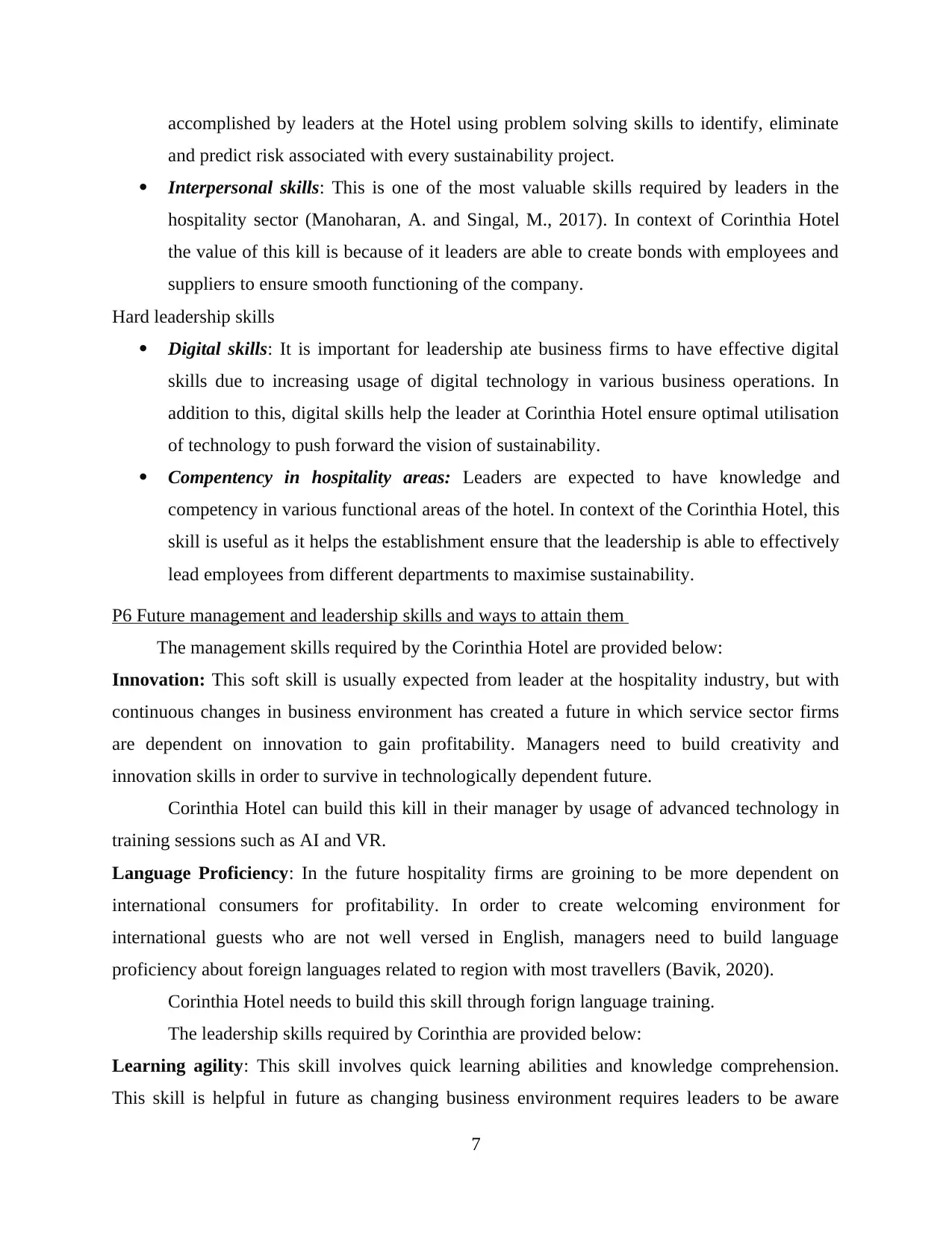
accomplished by leaders at the Hotel using problem solving skills to identify, eliminate
and predict risk associated with every sustainability project.
Interpersonal skills: This is one of the most valuable skills required by leaders in the
hospitality sector (Manoharan, A. and Singal, M., 2017). In context of Corinthia Hotel
the value of this kill is because of it leaders are able to create bonds with employees and
suppliers to ensure smooth functioning of the company.
Hard leadership skills
Digital skills: It is important for leadership ate business firms to have effective digital
skills due to increasing usage of digital technology in various business operations. In
addition to this, digital skills help the leader at Corinthia Hotel ensure optimal utilisation
of technology to push forward the vision of sustainability.
Compentency in hospitality areas: Leaders are expected to have knowledge and
competency in various functional areas of the hotel. In context of the Corinthia Hotel, this
skill is useful as it helps the establishment ensure that the leadership is able to effectively
lead employees from different departments to maximise sustainability.
P6 Future management and leadership skills and ways to attain them
The management skills required by the Corinthia Hotel are provided below:
Innovation: This soft skill is usually expected from leader at the hospitality industry, but with
continuous changes in business environment has created a future in which service sector firms
are dependent on innovation to gain profitability. Managers need to build creativity and
innovation skills in order to survive in technologically dependent future.
Corinthia Hotel can build this kill in their manager by usage of advanced technology in
training sessions such as AI and VR.
Language Proficiency: In the future hospitality firms are groining to be more dependent on
international consumers for profitability. In order to create welcoming environment for
international guests who are not well versed in English, managers need to build language
proficiency about foreign languages related to region with most travellers (Bavik, 2020).
Corinthia Hotel needs to build this skill through forign language training.
The leadership skills required by Corinthia are provided below:
Learning agility: This skill involves quick learning abilities and knowledge comprehension.
This skill is helpful in future as changing business environment requires leaders to be aware
7
and predict risk associated with every sustainability project.
Interpersonal skills: This is one of the most valuable skills required by leaders in the
hospitality sector (Manoharan, A. and Singal, M., 2017). In context of Corinthia Hotel
the value of this kill is because of it leaders are able to create bonds with employees and
suppliers to ensure smooth functioning of the company.
Hard leadership skills
Digital skills: It is important for leadership ate business firms to have effective digital
skills due to increasing usage of digital technology in various business operations. In
addition to this, digital skills help the leader at Corinthia Hotel ensure optimal utilisation
of technology to push forward the vision of sustainability.
Compentency in hospitality areas: Leaders are expected to have knowledge and
competency in various functional areas of the hotel. In context of the Corinthia Hotel, this
skill is useful as it helps the establishment ensure that the leadership is able to effectively
lead employees from different departments to maximise sustainability.
P6 Future management and leadership skills and ways to attain them
The management skills required by the Corinthia Hotel are provided below:
Innovation: This soft skill is usually expected from leader at the hospitality industry, but with
continuous changes in business environment has created a future in which service sector firms
are dependent on innovation to gain profitability. Managers need to build creativity and
innovation skills in order to survive in technologically dependent future.
Corinthia Hotel can build this kill in their manager by usage of advanced technology in
training sessions such as AI and VR.
Language Proficiency: In the future hospitality firms are groining to be more dependent on
international consumers for profitability. In order to create welcoming environment for
international guests who are not well versed in English, managers need to build language
proficiency about foreign languages related to region with most travellers (Bavik, 2020).
Corinthia Hotel needs to build this skill through forign language training.
The leadership skills required by Corinthia are provided below:
Learning agility: This skill involves quick learning abilities and knowledge comprehension.
This skill is helpful in future as changing business environment requires leaders to be aware
7
⊘ This is a preview!⊘
Do you want full access?
Subscribe today to unlock all pages.

Trusted by 1+ million students worldwide
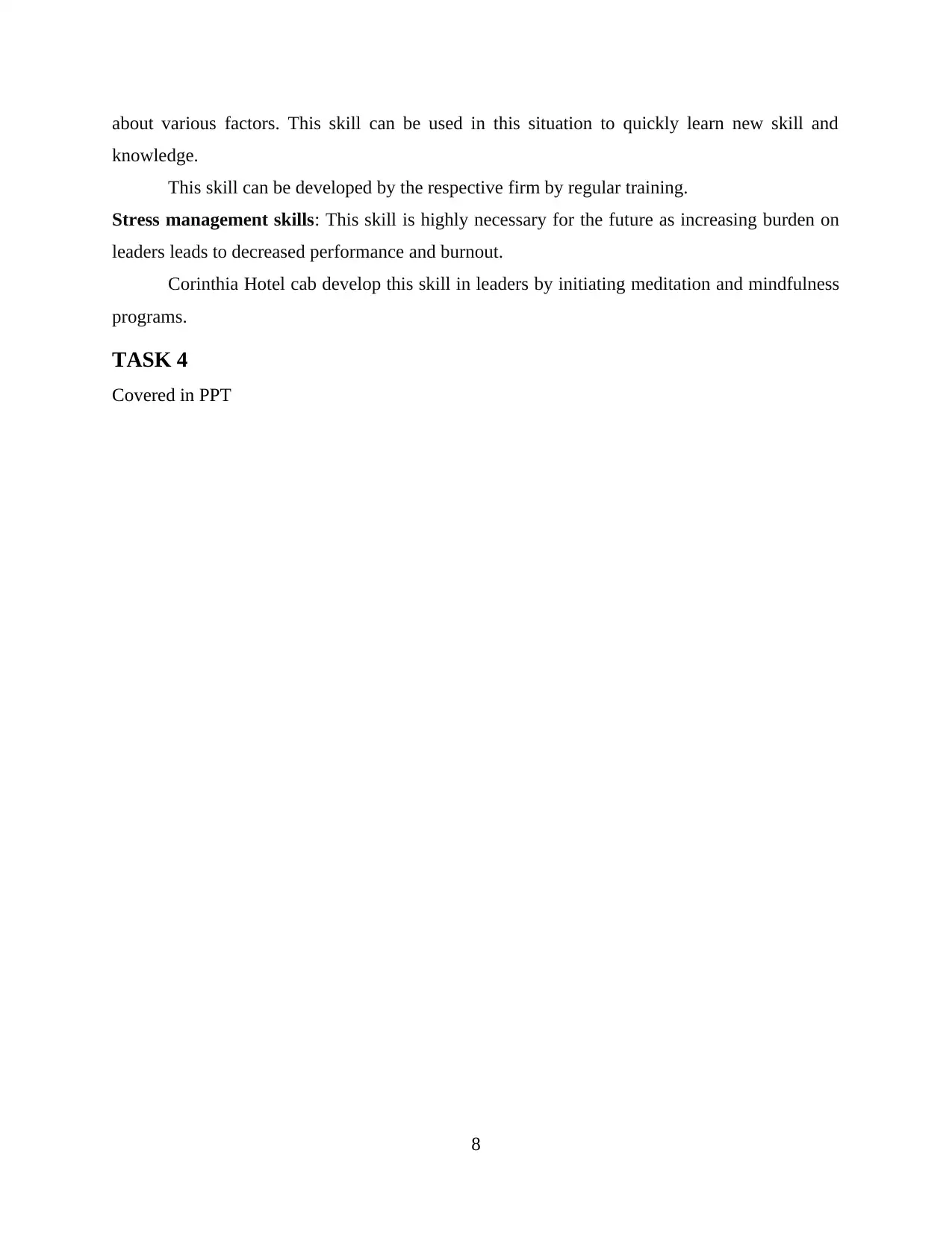
about various factors. This skill can be used in this situation to quickly learn new skill and
knowledge.
This skill can be developed by the respective firm by regular training.
Stress management skills: This skill is highly necessary for the future as increasing burden on
leaders leads to decreased performance and burnout.
Corinthia Hotel cab develop this skill in leaders by initiating meditation and mindfulness
programs.
TASK 4
Covered in PPT
8
knowledge.
This skill can be developed by the respective firm by regular training.
Stress management skills: This skill is highly necessary for the future as increasing burden on
leaders leads to decreased performance and burnout.
Corinthia Hotel cab develop this skill in leaders by initiating meditation and mindfulness
programs.
TASK 4
Covered in PPT
8
Paraphrase This Document
Need a fresh take? Get an instant paraphrase of this document with our AI Paraphraser
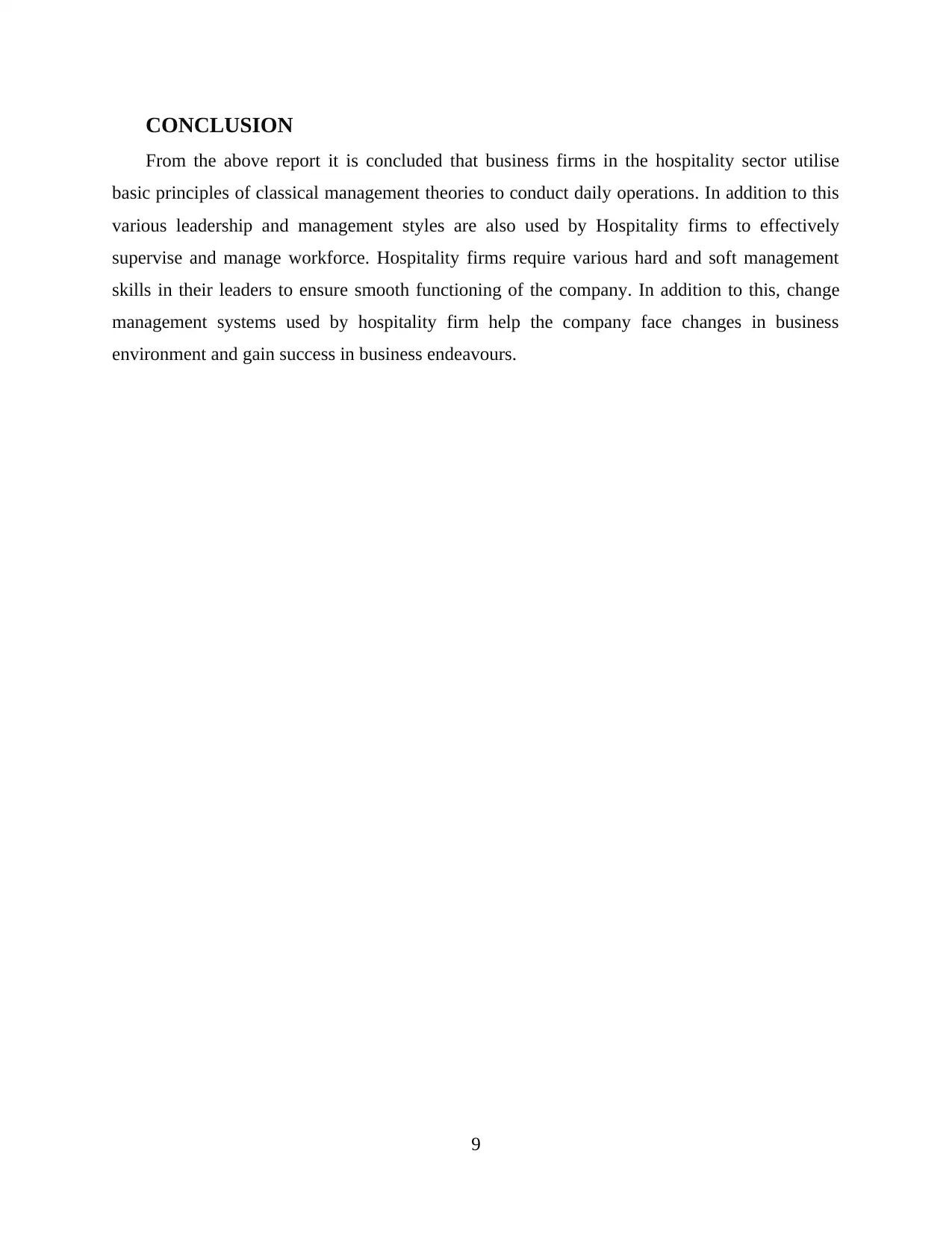
CONCLUSION
From the above report it is concluded that business firms in the hospitality sector utilise
basic principles of classical management theories to conduct daily operations. In addition to this
various leadership and management styles are also used by Hospitality firms to effectively
supervise and manage workforce. Hospitality firms require various hard and soft management
skills in their leaders to ensure smooth functioning of the company. In addition to this, change
management systems used by hospitality firm help the company face changes in business
environment and gain success in business endeavours.
9
From the above report it is concluded that business firms in the hospitality sector utilise
basic principles of classical management theories to conduct daily operations. In addition to this
various leadership and management styles are also used by Hospitality firms to effectively
supervise and manage workforce. Hospitality firms require various hard and soft management
skills in their leaders to ensure smooth functioning of the company. In addition to this, change
management systems used by hospitality firm help the company face changes in business
environment and gain success in business endeavours.
9
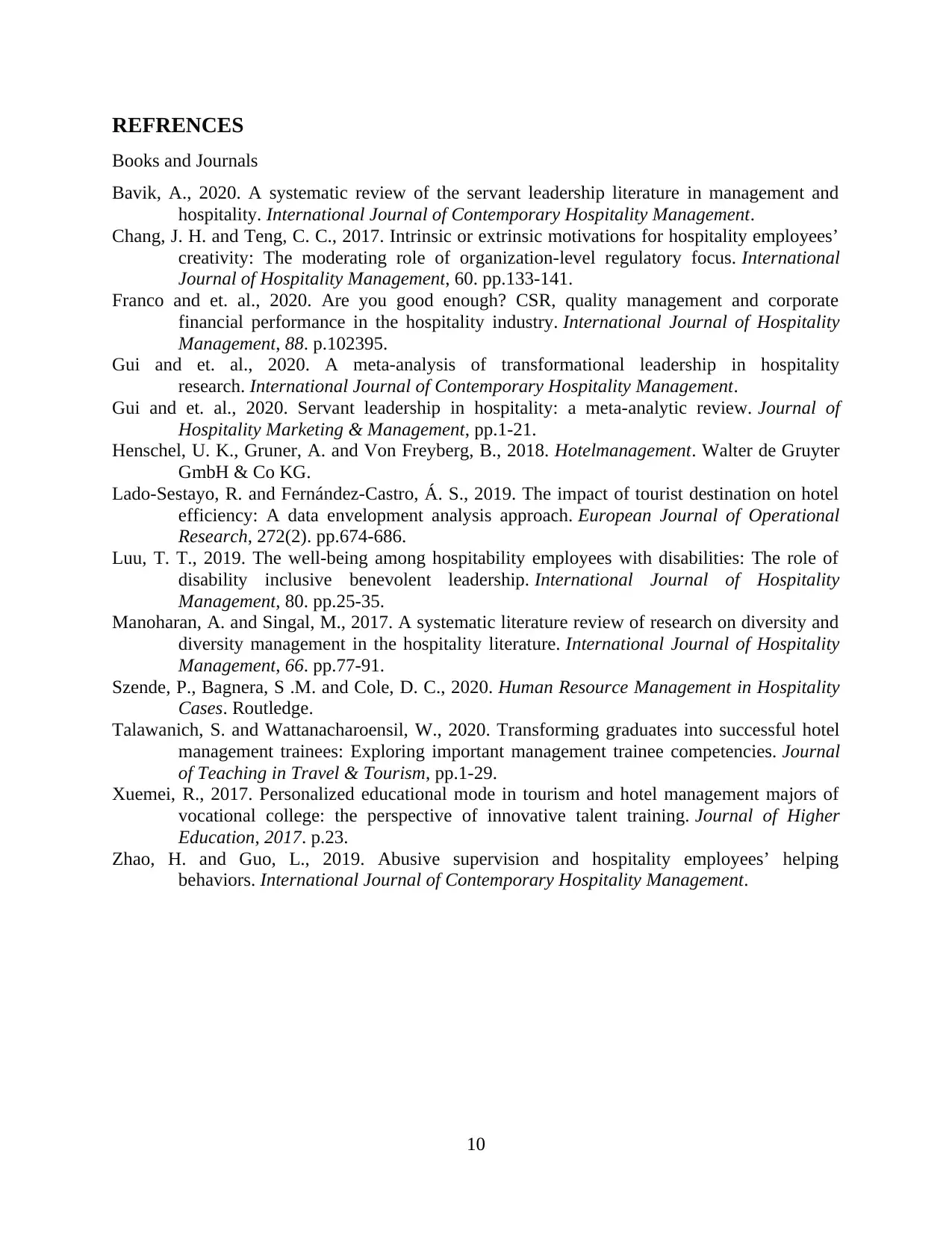
REFRENCES
Books and Journals
Bavik, A., 2020. A systematic review of the servant leadership literature in management and
hospitality. International Journal of Contemporary Hospitality Management.
Chang, J. H. and Teng, C. C., 2017. Intrinsic or extrinsic motivations for hospitality employees’
creativity: The moderating role of organization-level regulatory focus. International
Journal of Hospitality Management, 60. pp.133-141.
Franco and et. al., 2020. Are you good enough? CSR, quality management and corporate
financial performance in the hospitality industry. International Journal of Hospitality
Management, 88. p.102395.
Gui and et. al., 2020. A meta-analysis of transformational leadership in hospitality
research. International Journal of Contemporary Hospitality Management.
Gui and et. al., 2020. Servant leadership in hospitality: a meta-analytic review. Journal of
Hospitality Marketing & Management, pp.1-21.
Henschel, U. K., Gruner, A. and Von Freyberg, B., 2018. Hotelmanagement. Walter de Gruyter
GmbH & Co KG.
Lado-Sestayo, R. and Fernández-Castro, Á. S., 2019. The impact of tourist destination on hotel
efficiency: A data envelopment analysis approach. European Journal of Operational
Research, 272(2). pp.674-686.
Luu, T. T., 2019. The well-being among hospitability employees with disabilities: The role of
disability inclusive benevolent leadership. International Journal of Hospitality
Management, 80. pp.25-35.
Manoharan, A. and Singal, M., 2017. A systematic literature review of research on diversity and
diversity management in the hospitality literature. International Journal of Hospitality
Management, 66. pp.77-91.
Szende, P., Bagnera, S .M. and Cole, D. C., 2020. Human Resource Management in Hospitality
Cases. Routledge.
Talawanich, S. and Wattanacharoensil, W., 2020. Transforming graduates into successful hotel
management trainees: Exploring important management trainee competencies. Journal
of Teaching in Travel & Tourism, pp.1-29.
Xuemei, R., 2017. Personalized educational mode in tourism and hotel management majors of
vocational college: the perspective of innovative talent training. Journal of Higher
Education, 2017. p.23.
Zhao, H. and Guo, L., 2019. Abusive supervision and hospitality employees’ helping
behaviors. International Journal of Contemporary Hospitality Management.
10
Books and Journals
Bavik, A., 2020. A systematic review of the servant leadership literature in management and
hospitality. International Journal of Contemporary Hospitality Management.
Chang, J. H. and Teng, C. C., 2017. Intrinsic or extrinsic motivations for hospitality employees’
creativity: The moderating role of organization-level regulatory focus. International
Journal of Hospitality Management, 60. pp.133-141.
Franco and et. al., 2020. Are you good enough? CSR, quality management and corporate
financial performance in the hospitality industry. International Journal of Hospitality
Management, 88. p.102395.
Gui and et. al., 2020. A meta-analysis of transformational leadership in hospitality
research. International Journal of Contemporary Hospitality Management.
Gui and et. al., 2020. Servant leadership in hospitality: a meta-analytic review. Journal of
Hospitality Marketing & Management, pp.1-21.
Henschel, U. K., Gruner, A. and Von Freyberg, B., 2018. Hotelmanagement. Walter de Gruyter
GmbH & Co KG.
Lado-Sestayo, R. and Fernández-Castro, Á. S., 2019. The impact of tourist destination on hotel
efficiency: A data envelopment analysis approach. European Journal of Operational
Research, 272(2). pp.674-686.
Luu, T. T., 2019. The well-being among hospitability employees with disabilities: The role of
disability inclusive benevolent leadership. International Journal of Hospitality
Management, 80. pp.25-35.
Manoharan, A. and Singal, M., 2017. A systematic literature review of research on diversity and
diversity management in the hospitality literature. International Journal of Hospitality
Management, 66. pp.77-91.
Szende, P., Bagnera, S .M. and Cole, D. C., 2020. Human Resource Management in Hospitality
Cases. Routledge.
Talawanich, S. and Wattanacharoensil, W., 2020. Transforming graduates into successful hotel
management trainees: Exploring important management trainee competencies. Journal
of Teaching in Travel & Tourism, pp.1-29.
Xuemei, R., 2017. Personalized educational mode in tourism and hotel management majors of
vocational college: the perspective of innovative talent training. Journal of Higher
Education, 2017. p.23.
Zhao, H. and Guo, L., 2019. Abusive supervision and hospitality employees’ helping
behaviors. International Journal of Contemporary Hospitality Management.
10
⊘ This is a preview!⊘
Do you want full access?
Subscribe today to unlock all pages.

Trusted by 1+ million students worldwide
1 out of 12
Related Documents
Your All-in-One AI-Powered Toolkit for Academic Success.
+13062052269
info@desklib.com
Available 24*7 on WhatsApp / Email
![[object Object]](/_next/static/media/star-bottom.7253800d.svg)
Unlock your academic potential
Copyright © 2020–2026 A2Z Services. All Rights Reserved. Developed and managed by ZUCOL.




